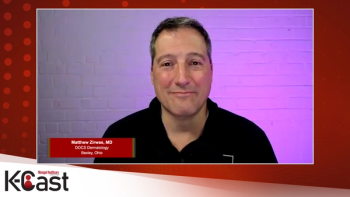
Value-Based Decision-Making in Metastatic Breast Cancer
In this Managed Healthcare Executive® KCast, Ian Krop, M.D., Ph.D., oncologist and associate professor of medicine at Dana-Farber Cancer Institute in Boston, and Debra Patt, M.D., Ph.D., MBA, executive vice president at Texas Oncology in Austin, provide key insights into the value-based care model for patients with HER2-positive metastatic breast cancer (mBC). This article summarizes the highlights of the discussion.
HER2-Positive mBC Standard of Care: Chemotherapy Plus HER2-targeted Therapy
For patients with newly diagnosed HER2-positive mBC, Krop and Patt explained that the current standard-of-care regimen includes both chemotherapy and HER2-targeted therapy, as the combination has been demonstrated to be more efficacious than using either alone. They added that treatment typically involves a taxane, such as Taxol (paclitaxel) or Taxotere (docetaxel), combined with the monoclonal antibody Herceptin (trastuzumab), but recently, chemotherapy combined with dual HER2-directed therapies, Herceptin and Perjeta (pertuzumab) has demonstrated increased survival benefit.1
Advances in the Therapeutic Landscape
There have been several advancements in the therapeutic landscape of HER2-positive mBC, many of which have created additional treatment options in later lines of therapy. Nerlynx (neratinib) in combination with Xeloda (capecitabine) was approved by the FDA in February 2020 for adult patients with advanced or metastatic HER2-positive breast cancer who have received two or more prior anti-HER2-based regimens in the metastatic setting.2,3 Soon after, in April 2020, the FDA approved Tukysa (tucatinib) in combination with Herceptin and Xeloda for the treatment of adults with advanced unresectable or metastatic HER2-positive breast cancer, including patients with brain metastases, who have received one or more prior anti-HER2-based regimens in the metastatic setting.4 Later that same year in December, the FDA approved Margenza (margetuximab-cmkb) in combination with chemotherapy for adults with HER2-positive mBC who have received two or more prior anti-HER2 regimens, at least one of which was for metastatic disease.5,6
Additional combinations are being explored in ongoing clinical trials in patients with HER2-positive mBC. The phase 3 DESTINY-Breast09 trial aims to evaluate Enhertu (trastuzumab deruxtecan) with or without Perjeta versus the standard-of-care regimen (taxane, Herceptin and Perjeta) in the first-line metastatic setting. The primary end point of the study is progression-free survival (PFS; assessed by blinded independent central review); some of the secondary end points include investigator-assessed PFS, overall survival, objective response rate, duration of response, time to second progression or death and health-related quality of life.7,8 Previously, Enhertu was granted accelerated approval by the FDA in December 2019 for patients with unresectable or metastatic HER2-positive breast cancer who have received two or more prior anti-HER2-based regimens in the metastatic setting.9,10
Although the therapeutic landscape for HER2-positive mBC has experienced recent innovations, numerous challenges have the potential to affect the overall delivery of care.
Challenges With Current Treatment Approaches
Most patients with HER2-positive mBC will be treated with chemotherapy in combination with HER2-directed therapy, but clinicians must still make treatment decisions that consider patient-specific factors, as well as systemic obstacles that may affect the delivery of appropriate care.
Treatment Toxicity
Krop and Patt agreed that therapeutic approaches in HER2-positive mBC can be associated with treatment toxicity, which can have lasting effects on the patient’s quality of life. Numerous patient-driven factors can influence how therapy is tolerated, including patient age, performance status, comorbidities and location of metastases, according to Patt. She added that when patients are overburdened with toxicity from treatment, they may be less able to maintain productivity in the workforce, compounding the financial burden of treatment.
Financial Burden and Access Barriers
The financial burden of treatment can be an obstacle to care. "These drugs are all incredibly expensive, and it’s a big challenge for the healthcare industry and for our society," Krop noted. "It’s a societal problem that we’re going to have to deal with.” Patients with HER2-positive mBC are typically treated using combination regimens, which can compound the overall cost of therapy. Many of the available HER2-targeting agents are costly, with those entering the treatment landscape more recently being particularly expensive. However, treatment may still be cost prohibitive even when biosimilars enter the market, Patt added. Additionally, she indicated that the overall cost of treatment is also likely to increase as HER2-directed agents have the potential to receive FDA approval for use in earlier lines of treatment.
Both Krop and Patt emphasized that it is critical for clinicians to recognize that there may be challenges associated with insurance coverage when it comes to treating HER2-positive mBC. Among patients with commercially available insurance, prior authorization can pose a significant challenge, delaying appropriate therapy and imaging. Patients with Medicare may encounter unique obstacles to care related to formulary choice, reimbursement and single-dose vials. Patt further explained that patients who are uninsured are likely to encounter significant barriers to appropriate treatment; there may be charitable care pathways available, but these are highly variable by region and other factors.
Administration and Dose Schedules
According to Krop and Patt, the use of chemotherapy in combination with HER2-directed agents can increase the overall treatment burden for patients with HER2-positive mBC. When on combination therapy, patients may have medications with multiple routes of administration and dosing cycles. This can be challenging for patients to keep track of, so they sometimes require additional coaching about when to take their medication at home and when to come into the clinic for infusion, Krop explained. To accommodate the difficulty of managing complex treatment regimens, Patt noted, “When you use those other agents at different cycles, sometimes people do consider alternative schedules of these therapeutic interventions to try to keep treatment more convenient for the patient.”
Health System Utilization
Patients with HER2-positive mBC may also encounter obstacles associated with their overall healthcare system utilization, particularly because disease management typically involves monitoring and treating potential side effects of therapy. Patt described how patients require follow-up echocardiograms to evaluate their cardiac function, for example. Managing this side effect of treatment involves numerous added touch points with the healthcare system. Even without side effects complicating treatment, additional steps such as surgical or radiological intervention may complicate already challenging cost and access issues, Patt added. She explained that the scope of healthcare utilization required by patients with HER2-positive mBC can exacerbate problems associated with overburdened and understaffed healthcare systems. This can result in critical delays to receiving lab results, scheduling imaging and performing biopsies, she noted.
COVID-19 Contingencies
Patt described how, in the era of COVID-19, there have been pervasive decreases in cancer screening, biopsies, diagnoses and subsequent therapeutic intervention. In addition to these reductions in cancer care diagnoses, she said, there have been challenges with managing patients with metastatic disease: “We have been burdened by a global pandemic, (so) all the work-up (that) patients need in the metastatic setting is a little delayed. It’s taking longer. There are capacity limitations in the ability to do biopsies or additional imaging.”
Physicians have needed to adjust their treatment strategy to accommodate existing patients. According to Krop, some healthcare providers have reconsidered the use of immunosuppressive regimens or started using longer-acting therapies to minimize the number of clinic visits necessary. Visiting nurse services and phone- or internet-based forms of communication have also been used, but Krop indicated that the degree to which these will remain cost-effective or feasible at scale post-pandemic is unclear.
National Comprehensive Cancer Network (NCCN) Guidelines
Krop commented on the value of current treatment guidelines for HER2-positive mBC by stating, “If you look at the NCCN Guidelines, they’re not very directive.” He explained that this can make it challenging to navigate patient-specific factors when deciding whether to use upfront chemotherapy versus an alternative therapy. Current guidelines do not specify which patients may derive benefit; they provide helpful guardrails, but there are many reasons why a patient’s treatment plan may deviate from the guideline-directed approach.
Value-based Care Models in mBC
Taking a value-based approach to the care of HER2-positive mBC requires an analysis of the potential benefits and costs of treatment to provide appropriate care for patients. For the future management of patients with HER2-positive mBC, both Krop and Patt agreed that the healthcare system should provide patients with treatment that is both medically effective and cost effective to maximize disease control without causing undue burden on patients and the healthcare system.
Patt addressed value-based care in HER2-positive mBC: “The most important value-based initiative is that patients go on to live disease free. You can’t discount that because I think superior efforts and the best possible evidence for disease control [are] the most appropriate value-based choices," she said. “Patients with HER-2 positive metastatic breast cancer can benefit from these long disease-free intervals (for) more than a decade. And so I think a question remains: 'How can we give the most effective therapy upfront, and then keep them on some chronic therapy in perpetuity to keep their disease controlled, and (do this in) the most cost-efficient way?' And with so many innovator products in this space, I think we're going to have better answers there in the next years to come.”
REFERENCES
1. Swain SM, Miles D, Kim SB, et al. Pertuzumab, trastuzumab, and docetaxel for HER2-positive metastatic breast cancer (CLEOPATRA): end-of-study results from a double-blind, randomised, placebo-controlled, phase 3 study. Lancet Oncol. 2020;21(4):519-530. doi:10.1016/S1470-2045(19)30863-0
2. FDA approves neratinib for metastatic HER2-positive breast cancer. FDA. February 26, 2020. Accessed August 5, 2021. https://
3. Nerlynx. Prescribing information. Puma Biotechnology; 2021. Accessed August 5, 2021.
4. Tukysa. Prescribing information. Seagen; 2020. Accessed August 5, 2021.
5. FDA approves margetuximab for metastatic HER2-positive breast cancer. FDA. December 17, 2020. Accessed August 5, 2021.
6. Margenza. Prescribing information. MacroGenics; 2020. Accessed August 5, 2021.
7. DESTINY-Breast09 head-to-head first-line phase 3 trial of Enhertu initiated in patients with HER2 positive metastatic breast cancer. News release. Daiichi Sankyo. June 14, 2021. Accessed August 5, 2021.
8. Trastuzumab deruxtecan (T-DXd) with or without pertuzumab versus taxane, trastuzumab and pertuzumab in HER2-positive metastatic breast cancer (DESTINY-Breast09). ClinicalTrials.gov. Updated August 2, 2021. Accessed August 3, 2021.
9. FDA approves fam-trastuzumab deruxtecan-nxki for unresectable or metastatic HER2-positive breast cancer. FDA. December 20, 2019. Accessed August 5, 2021.
10. Enhertu. Prescribing information. Daiichi Sankyo; 2021. Accessed August 5, 2021.
Newsletter
Get the latest industry news, event updates, and more from Managed healthcare Executive.




















